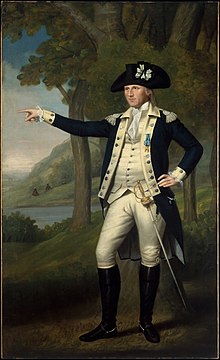Marinus Willett | |
|---|---|
 | |
| 48th Mayor of New York City | |
| In office 1807–1808 | |
| Preceded by | DeWitt Clinton |
| Succeeded by | DeWitt Clinton |
| Personal details | |
| Born | July 31, 1740 Jamaica, Queens |
| Died | August 22, 1830 (aged 90) New York City, New York |
| Political party | Anti-Federalist Party Democratic Republican |
| Spouse(s) | Mary Pearsee (m. 1760) Susannah Vardill (m. 1793) Margaret Bancker (m. 1800) |
| Children | 6 |
| Profession | Military officer, politician |
| Military service | |
| Allegiance | (1754–1763) (1776–1783) |
| Branch/service | (1754–1763) (1776–1783) |
| Rank | Colonel |
| Unit | 1st New York Regiment 3rd New York Regiment 5th New York Regiment Tryon County militia |
| Battles/wars | |
Colonel Marinus Willett (July 31, 1740 – August 22, 1830) was an American military officer, politician and merchant who served as the mayor of New York City from 1807 to 1808. Willett is best known for his actions during the American Revolution, where he served as an important Patriot leader in colonial New York before enlisting in the Continental Army and serving in numerous campaigns in the Revolutionary War throughout the Northwest.
Born in Jamaica, Queens, Willett underwent an apprenticeship as a cabinetmaker before enlisting in the New York Militia after the French and Indian War broke out in 1754. He participated in the Ticonderoga campaign and the British capture of Fort Frontenac in 1758, before falling sick and being transferred to Fort Stanwix in order to recuperate. After the end of the conflict in 1763, he entered King's College in New York in 1772 and graduated in 1776.
A prominent member of the Sons of Liberty, Willett enlisted in the 1st New York Regiment in 1775, taking part in the failed Invasion of Quebec before transferring to the 3rd New York Regiment in 1776. Fighting at Monmouth, Willett subsequently participated in the 1778 Sullivan Expedition. He was made colonel of the 5th New York Regiment in 1780 and the Tryon County militia in 1781, where he fought at Johnstown before the war's end in 1783.
After the conflict, Willett returned to New York, working as a merchant and aligning himself with the Anti-Federalist Party; he was elected to the New York State Assembly in December 1783. In addition to serving intermittently as New York County Sheriff, Willett also served as New York City's mayor for a year. On August 22, 1830, Willett died and was buried in the graveyard of Trinity Church. The town of Willet, New York, is named in his honor.
